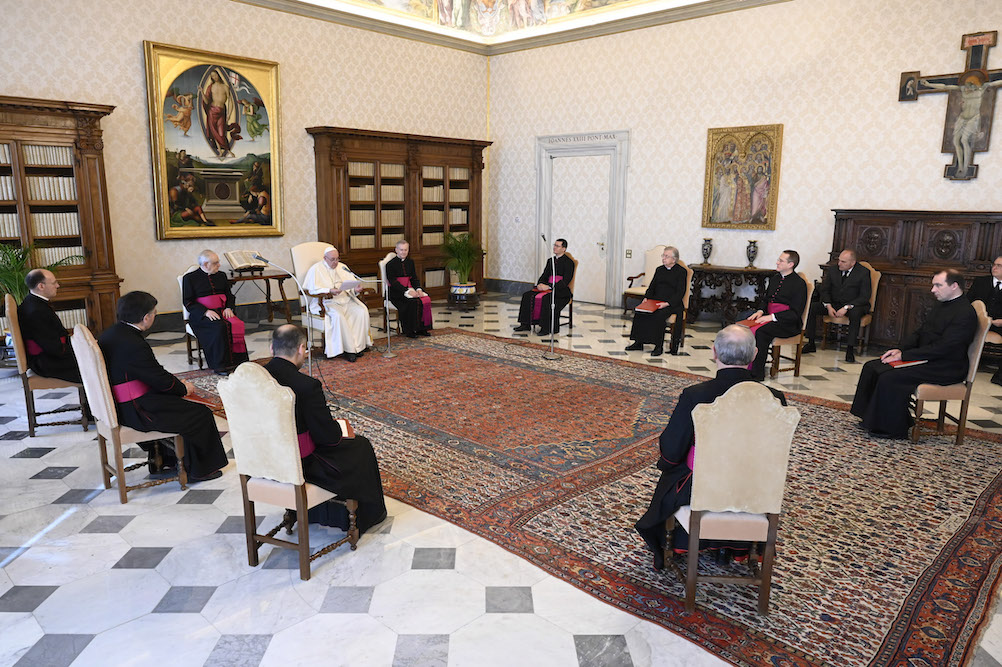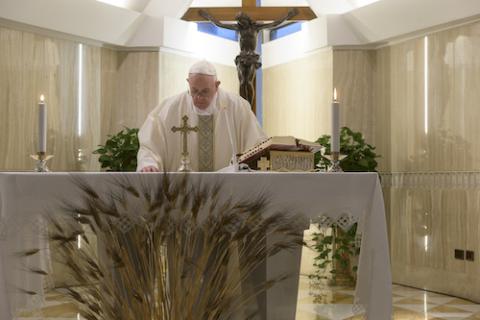
Pope Francis holds his weekly general audience April 15 in the papal library in the Apostolic Palace, with people spread out to avoid transmission of the coronavirus. (CNS/Vatican Media)
When Massimo Faggioli offers a critique of this pontificate, as he did last week at La Croix in a two-part essay, here and here, everyone should take notice. Not only is Faggioli one of the leading ecclesiologists in the universal church, but he has been strongly supportive of Pope Francis.
The first thing to note is how Faggioli engages the topic: He is deeply respectful, expressing concern not scorn, his analysis does not lead him down a rabbit hole in which the conversation is suddenly devoid of the ecclesial set forth at Vatican II. His concerns about ecclesial structures were acquired by careful readings of Yves Congar, not from an MBA program or political campaign. Faggioli's language is always ecclesial language, never some bizarre extrapolation of Foucaultian ideas about the relationship of power and sexuality nor an ecclesiological variation of game theory. He knows that the church is a gift, not Silly Putty, and there are limits as well as possibilities baked into the constitution of the church.
His central claims are these:
One has the impression that during the last several months the dynamism of his pontificate has begun to reach its limit.
And:
Recent events — such as his decision to ignore a suggestion by the Amazon bishops to ordain married priests, and his establishment of a new study commission on the female diaconate that does not appear in favor of ordaining women deacons — suggest to reform-minded Catholics that his pontificate is in crisis.
The issues of synodality and the role of women in the church are, without doubt, crucial issues for Francis and for the church. But, before hitting those questions head on, let's examine some of the points Faggioli assembles to make his case. I think this examination will encourage Faggioli to be a tad less definitive in his pronouncing this pontificate has lost steam and is now in crisis.
For example, he worries about "pressure coming from bishops and cardinals over the last year, which has threatened the pope's legitimacy," and cites Cardinal Gerhard Müller, former prefect of the Congregation for the Doctrine of the Faith, and Cardinal Robert Sarah, prefect of the Congregation for Divine Worship and the Discipline of the Sacraments. It is true that both men released documents aimed at obstructing reforms, but Faggioli is not clear what is to be done about these men.
Why does Francis not push back more strongly against these critics? What should he do, demand their resignation from the College of Cardinals or devise some similar punishment? That would only make them martyrs. Müller is already retired, and Sarah hits 75 in June. Better to let them wander off into the sunset like old lounge singers: They may get the occasional booking at a second-tier club, but their careers are over and they are now mostly embarrassing themselves.
Advertisement
Faggioli, oddly, does not call attention to a pending personnel appointment that will dramatically shape the church: Cardinal Marc Ouellet will soon be replaced as prefect of the Congregation for Bishops. Just as the appointment of Cardinal Luis Tagle to lead the Congregation for the Evangelization of Peoples portends a new day, Ouellet's replacement can reshape the church in profound ways.
Similarly, it is unclear why Faggioli's call for structural reforms did not take cognizance of the forthcoming apostolic constitution on the reform of the Roman Curia. He makes a brilliant point I have never seen made before — "The pope can ignore the Roma Curia in a way other Catholics cannot — that includes bishops and priests" — and there are a variety of reasons why the curial reforms have taken so long, not least the pope's insistence on extensive consultation. But, in causal conversations with bishops returning from their ad limina visits, they noted the differences in the way these important meetings were handled. Three items stood out: the frank and lengthy conversation with the pope himself, the changed demeanor of curial officials who asked how they could help rather than start with a berating lecture, and the presence of women in positions of responsibility at the meetings with certain dicasteries. Let's see what the apostolic constitution on curial reform does to further advance a change in the culture of the Vatican.
The larger question Faggioli poses remains: Why has this reformist pope not moved forward on two areas of internal church reform, the restoration of a female diaconate and the request from the Amazon synod to ordain older, married men, or viri probati, under particular circumstances? I suggest two smaller possibilities and one big one.
First, the small ones. On the issue of women deacons, it has been clear for some time that moving forward on that front would likely further entrench the association of decision-making authority with ordination: Clericalizing women doesn't do much to end clericalism. On the issue of ordaining older, married men to the priesthood, that is a change so big that if introduced in the Amazon, it would follow elsewhere, too, and so the Amazon synod was not the vehicle for that kind of change.

Pope Francis celebrates Mass in the chapel of his Vatican residence April 16. (CNS/Vatican Media)
To play devil's advocate, Faggioli is undoubtedly correct that asking for patience on the issue of the role of women in the church makes one feel like a "Letter from a Birmingham Jail" will soon be in your mailbox, that the demands of justice are urgent, and that at least in the West, the church risks alienating a whole generation of young Catholics because it excludes women from roles where it appears there is not even any doctrinal rationale. And, on the viri probati, Pope John Paul II and Pope Benedict XVI both found ways to ordain married men when Anglican priests came knocking, so why was it such a big deal this time except that conservatives decided to make it a big deal?
The larger possibility is this. When he became pope, indeed in the intervention that led to his election, Francis has called the church to look outward, to get out of the sacristy, to become a church of missionary disciples. Perhaps he thinks that this change in focus from ad intra to ad extra is a precondition that needs to be further met if the church is ever able to do internal reforms in ways that do not divide the church more than it already is. I confess that a two-thirds vote seems a narrow basis upon which to construct large changes. At Vatican II, the final documents were all passed with more than 90% approval. Is a two-thirds vote followed by a monarchical decision the way to secure deep seated reform?
Faggioli is right to suggest that the process of synodality begin to include academic theologians. Theologians were critical to the achievements made at Vatican II, and they should be included in these synods. In addition to providing possible solutions drawn from the tradition, they can serve as a sounding board to avoid problems, as sometimes popes and bishops do not have a knack for understanding how they sound when speaking to the general public. Theologians can also help each other recall that no issues exist in a vacuum. For example, ecclesiological discussions always contain a strong ecumenical component in the post-conciliar era.
I hope Francis and his advisors will read Faggioli's two-part essay in the spirit in which it was written: Faggioli is no "opponent" of this pope, and his concerns are real and they are shared by many. If the pope would give more interviews and allow his collaborators to do the same, introducing some transparency so that we know better why certain decisions are made, then much agita will dissipate. But not all. As Faggioli indicates, 55 years after the close of Vatican II, the people of God need better answers to the question why each post-conciliar pope has continued to make important contributions to social teaching, but each has shipwrecked on the shoals of ecclesial reform.
[Michael Sean Winters covers the nexus of religion and politics for NCR.]
Editor's note: Don't miss out on Michael Sean Winters' latest. Sign up and we'll let you know when he publishes new Distinctly Catholic columns.





